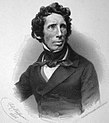1800 in Germany
| |||||
| Decades: |
| ||||
|---|---|---|---|---|---|
| See also: | Other events of 1800 History of Germany • Timeline • Years | ||||
Events from the year 1800 in Germany.
Incumbents[]
Holy Roman Empire[]
- Francis II (5 July 1792 – 6 August 1806)
Important Electors[]
- Bavaria- Maximilian I (16 February 1799 – 6 August 1806)[1]
- Saxony- Frederick Augustus I (17 December 1763 – 20 December 1806)[2]
Kingdoms[]
- Kingdom of Prussia
- Monarch – Frederick William III of Prussia (16 November 1797 – 7 June 1840)[3]
Grand Duchies[]
- Grand Duke of Mecklenburg-Schwerin
- Frederick Francis I– (24 April 1785 – 1 February 1837)[4]
- Grand Duke of Mecklenburg-Strelitz
- Charles II (2 June 1794 – 6 November 1816)[5]
- Grand Duke of Oldenburg
- Grand Duke of Saxe-Weimar
- Karl August (1758–1809) Raised to grand duchy in 1809
Principalities[]
- Schaumburg-Lippe
- George William (13 February 1787 – 1860)
- Schwarzburg-Rudolstadt
- Louis Frederick II (13 April 1793 – 28 April 1807)[7]
- Schwarzburg-Sondershausen
- Günther Friedrich Karl I (14 October 1794 – 19 August 1835)
- Principality of Reuss-Greiz
- Heinrich XIII (28 June 1800 – 29 January 1817)
- Waldeck and Pyrmont
- Friedrich Karl August (29 August 1763 – 24 September 1812)
Duchies[]
- Duke of Anhalt-Dessau
- Leopold III (16 December 1751 – 9 August 1817)[8]
- Duke of Saxe-Altenburg
- Duke of Saxe-Hildburghausen (1780–1826) - Frederick[4]
- Duke of Saxe-Coburg-Saalfeld
- Francis (8 September 1800 – 9 December 1806)
- Duke of Saxe-Meiningen
- Duke of Schleswig-Holstein-Sonderburg-Beck
- Frederick Charles Louis (24 February 1775 – 25 March 1816)[10]
- Duke of Württemberg
- Frederick I (22 December 1797 – 30 October 1816)[11]
Other[]
Events[]
- April 2 - Ludwig van Beethoven's Symphony No. 1 premieres at the Burgtheater, in Vienna.
- May 3 - Battle of Stockach: French victory
- May 3 - Battle of Engen: French victory
- May 4/5 - Battle of Messkirch: French victory
- May 9 - Battle of Biberach: French victory
- May 15 - Battle of Erbach: French victory
- June 19 – War of the Second Coalition: Battle of Höchstädt – General Jean Victor Marie Moreau leads French forces to victory, opening the Danube passageway to Vienna.
- June 27 - Battle of Neuburg: French victory
- November 22 – War of the Second Coalition: Hostilities resume.

December 3: Battle of Hohenlinden.
- December 1 - Battle of Ampfing
- December 3 - War of the Second Coalition: Battle of Hohenlinden – The French army defeats Habsburg and Bavarian troops.
Births[]
- January 26- Johann Gerhard Oncken, German Baptist preacher (died 1884)
- March 3 – Heinrich Georg Bronn, German geologist, paleontologist (died 1862)
- March 10- Victor Aimé Huber, German social reformer (died 1869)
- March 17 – Rudolf Ewald Stier, German Protestant churchman, mystic (died 1862)
- Gottfried Bernhardy, German philologist, literary historian (died 1875)
- Ernst Heinrich Karl von Dechen, German geologist, mineralogist (died 1889)
- March 28 – Johann Georg Wagler, German herpetologist (died 1832)
- April 16- Jakob Heine, German orthopaedist (died 1879)
- May 30 – Karl Wilhelm Feuerbach, German geometer (died 1834)
- July 31 – Friedrich Wöhler, German chemist (died 1882)
- August 20 – Bernhard Heine, German physician, bone specialist and inventor (died 1846)
- October 26 – Helmuth von Moltke the Elder, German Field Marshal (died 1891)
Approximate date[]
- Abraham Rice, German-born rabbi, first ordained rabbi to serve in the United States (died 1862)
Deaths[]
- January 3 – Count Karl-Wilhelm Finck von Finckenstein, Prime Minister of Prussia (born 1714)
- January 6- Friedrich Adolf Riedesel, German soldier (born 1738)
- January 11 – Kyra Frosini, Greek heroine (born 1773)
- January 16 – Johann Christian Wiegleb, German chemist (born 1732)
- February 4 – Charlotte Sophie of Aldenburg, German sovereign (born 1715)
- June 20 – Abraham Gotthelf Kästner, German mathematician (born 1719)
- June 28- Heinrich XI, Prince Reuss of Greiz, German noble (born 1722)
- September 10 – Johann David Schoepff, German naturalist, doctor (born 1752)
- October 4 – Johann Hermann, German physician, naturalist (born 1738)
References[]
- ^ Chisholm, Hugh, ed. (1911). . Encyclopædia Britannica. 17 (11th ed.). Cambridge University Press. p. 921.
- ^ "General German Biography - Wikisource". Retrieved 24 January 2021.
- ^ Encyclopaedia Britannica, The Editors of (30 July 2018). "Federick William III". Encyclopaedia Britannica.
- ^ Jump up to: a b c Genealogie ascendante jusqu'au quatrieme degre inclusivement de tous les Rois et Princes de maisons souveraines de l'Europe actuellement vivans [Genealogy up to the fourth degree inclusive of all the Kings and Princes of sovereign houses of Europe currently living] (in French). Bourdeaux: Frederic Guillaume Birnstiel. 1768. p. 38.
- ^ Huish, Robert (1821). Public and Private Life His Late Excellent and most Gracious Majesty George The Third. T. Kelly. p. 170.
- ^ Jump up to: a b "Oldenburg Royal Family". Monarchies of Europe. Archived from the original on 17 March 2006. Retrieved 1 January 2021.
- ^ Apfelstedt, F.; Apfelstedt, Heinrich Friedrich Theodor (1996). Das Haus Kevernburg-Schwarzburg von seinem Ursprunge bis auf unsere Zeit. Thüringer Chronik-Verlag Müllerott. ISBN 978-3-910132-29-0.
- ^ J. Morley, "The Bauhaus Effect," in Social Utopias of the Twenties (Germany: Müller Bushmann press, 1995), 11.
- ^ "Biografie Georg I (German)". Meininger Museen. Archived from the original on 15 September 2011. Retrieved 8 September 2014.
- ^ Albinus, Robert (1985). Lexikon der Stadt Königsberg Pr. und Umgebung (in German). Leer: Verlag Gerhard Rautenberg. p. 371. ISBN 3-7921-0320-6.
- ^ David, Saul (1998). Prince of pleasure : the Prince of Wales and the making of the Regency. New York : Atlantic Monthly Press. ISBN 978-0-87113-739-5. Retrieved 24 January 2021.
![]() Media related to 1800 in Germany at Wikimedia Commons
Media related to 1800 in Germany at Wikimedia Commons
Categories:
- Years of the 19th century in Germany
- 1800 in Germany
- 1800 by country
- 1800 in Europe


